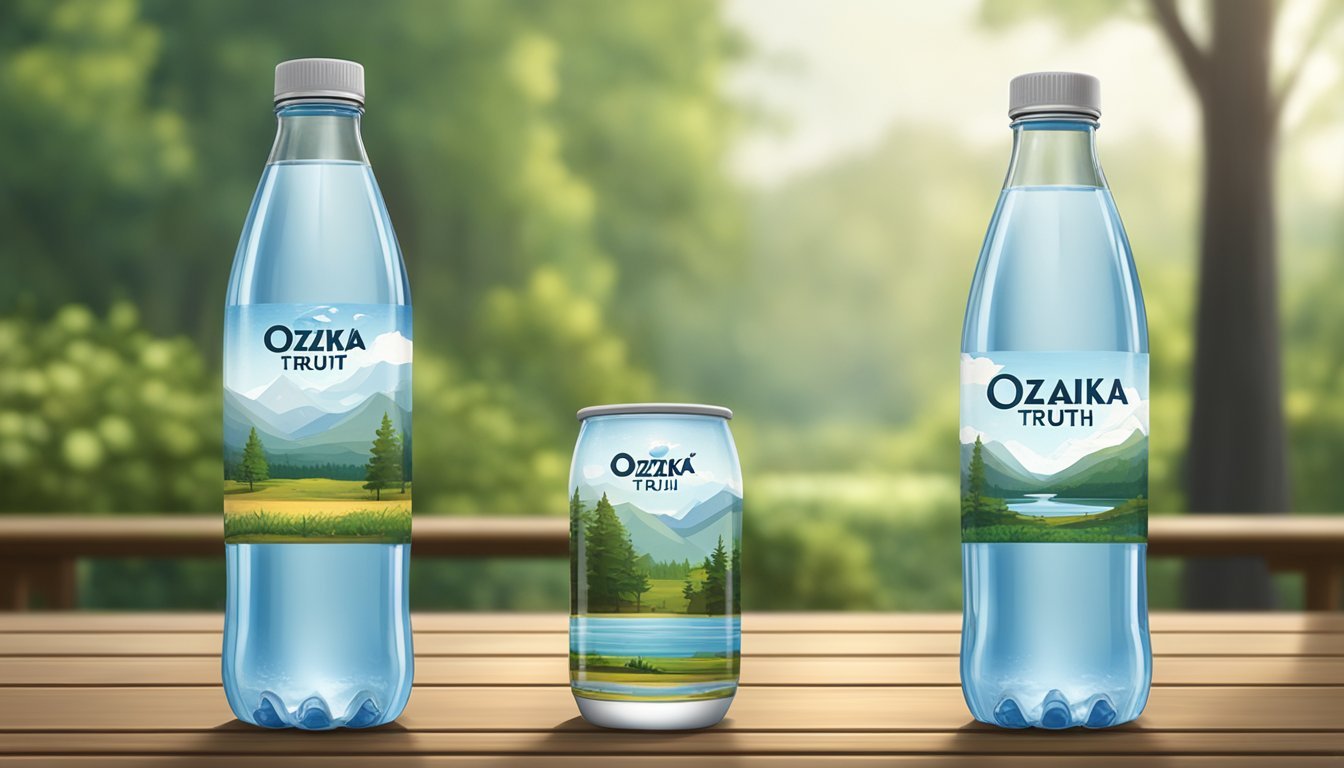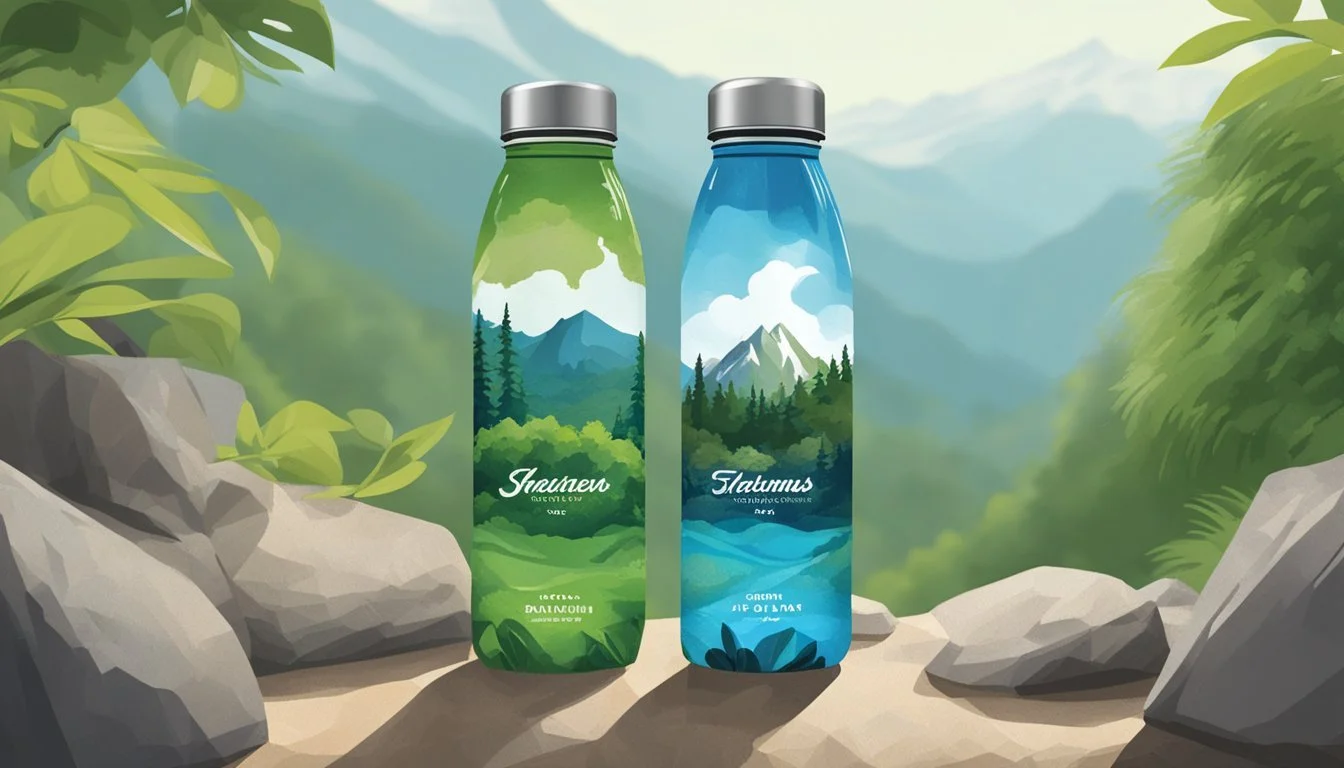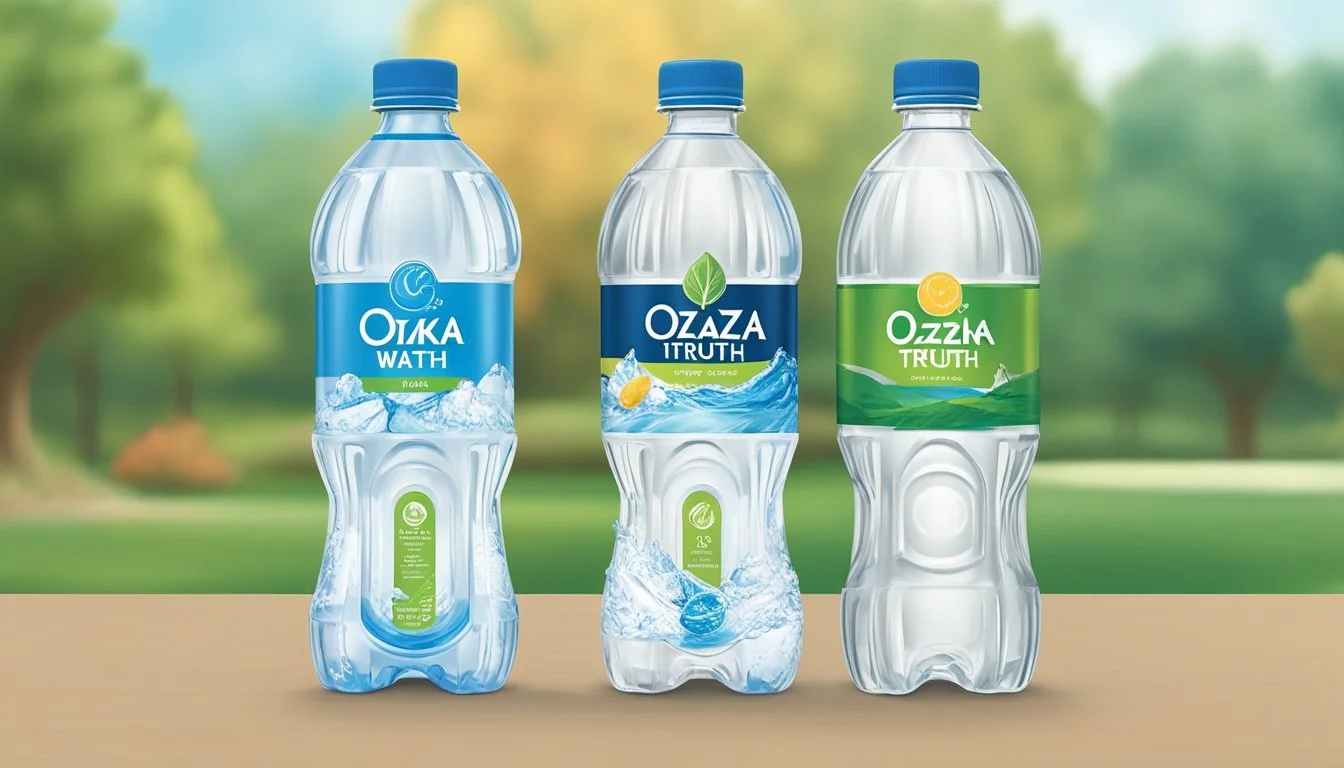Ozarka vs. Simple Truth
Comparing Quality and Taste in Bottled Water
When it comes to choosing the best bottled water, Ozarka and Simple Truth are two brands that often come to mind for many consumers seeking quality hydration. Ozarka, known for sourcing its water locally from Texas, offers a natural spring water experience. Their commitment to regional sourcing ensures that the water retains its natural minerals and taste, making it a favorite in its area.
On the other hand, Simple Truth provides a purified water option. With rigorous filtration processes ensuring the removal of impurities, Simple Truth caters to those who prefer a clean, consistent taste. This brand focuses on providing a pure hydration experience, free from contaminants and with added minerals for taste.
For those prioritizing the source and natural mineral content, Ozarka offers a taste of Texas' natural springs, whereas Simple Truth's advanced purification provides a reliable, clean choice. Each option brings its own benefits, making the decision ultimately dependent on personal preference for natural spring water versus purified water.
Comparing Ozarka and Simple Truth Brands
Ozarka and Simple Truth are two well-known bottled water brands that cater to different markets. This section examines the origins, branding strategies, market presence, and consumer perceptions of these two brands.
Brand History and Identity
Ozarka has a rich history dating back to 1905, originating from the pristine springs of the Ozark Mountains. It prides itself on sourcing 100% natural spring water and maintaining a commitment to local sourcing in Texas. This historical connection and regional focus foster a sense of reliability and tradition.
Simple Truth, on the other hand, is a private label brand under Kroger, launched in 2012. It emphasizes organic, natural products and sustainability. Unlike Ozarka, Simple Truth does not source exclusively from a single region, which allows it a broader geographic reach. The brand identity revolves around affordable, high-quality, and eco-conscious products.
Market Presence and Consumer Perceptions
Ozarka is widely recognized in the Southern United States, particularly in Texas, where its local sourcing adds a layer of trust and authenticity. The brand's focus on natural spring water appeals to those looking for unaltered, pure water options. Consumers appreciate Ozarka for its regional loyalty and consistent quality.
Simple Truth, available at Kroger and its affiliated stores, boasts a nationwide presence. Its emphasis on organic and eco-friendly products aligns well with consumer trends toward health and sustainability. Among its varied product line, Simple Truth bottled water is perceived as a dependable, green choice that complements a healthy lifestyle. This broad market reach and alignment with current trends make Simple Truth a popular choice among health-conscious shoppers.
By examining these aspects, consumers can better understand the unique qualities that Ozarka and Simple Truth bring to the bottled water market.
Source and Purity of Water
Ozarka and Simple Truth both emphasize the origins and treatment of their water. Understanding their natural spring water sources, purification processes, and adherence to quality standards is essential for consumers.
Natural Spring Water Sources
Ozarka sources its water from springs in Texas, emphasizing its distinctly southern origins. These springs are celebrated for their consistent, pure water flow. The brand promotes this regional aspect as part of its identity.
Simple Truth, on the other hand, sources its water from various natural springs across the United States. These locations are chosen for their pristine and uncontaminated environments. This variety in sourcing aims to maintain a high level of purity and freshness.
Purification and Filtration Processes
Ozarka uses a multi-step filtration process that includes reverse osmosis, which is known for effectively removing impurities. This method ensures that the water retains its natural minerals while ensuring safety and cleanliness.
Simple Truth emphasizes a thorough purification process as well. Their filtration includes several stages: sediment filtration, activated carbon filtration, and UV light treatment, ensuring that the final product is free from contaminants. The emphasis is on maintaining the natural mineral content while guaranteeing purity.
Quality and Safety Standards Compliance
Ozarka and Simple Truth adhere to strict quality and safety standards. They comply with EPA and FDA regulations, ensuring their products meet national health and safety benchmarks.
Ozarka regularly tests its water for various contaminants, providing transparency and assurance to its consumers. This rigorous testing process is part of its commitment to maintaining high-quality standards.
Simple Truth also follows stringent testing and monitoring protocols to comply with federal and state safety standards. They conduct routine inspections and maintain detailed records to ensure the integrity of their bottled water. This commitment to safety reflects their dedication to providing a reliable product.
Both brands emphasize their adherence to environmental regulations, ensuring that their operations do not negatively impact the natural sources they utilize.
Health and Hydration Benefits
When comparing Ozarka and Simple Truth bottled waters, it's vital to explore their health and hydration benefits. Key focus areas include the mineral content and hydration efficiency of each brand.
Mineral Content and Health Advantages
Ozarka is known for its spring water, which contains natural minerals that contribute to health benefits. The mineral composition can vary depending on the source, but it often includes essential electrolytes like calcium, magnesium, and potassium. These minerals support bone health, muscle function, and overall cellular activities.
Simple Truth, meanwhile, offers purified water, often enhanced with added minerals for taste. This purified water may not have the same natural mineral variety but ensures the absence of impurities and contaminants. The addition of minerals can include magnesium sulfate and potassium bicarbonate, providing similar health benefits as natural mineral water.
Table: Mineral Comparison
Mineral Ozarka (Spring) Simple Truth (Purified) Calcium Present Often added Magnesium Present Often added Potassium Present Often added
Hydration Efficiency
Hydration efficiency is crucial for overall health, impacting everything from physical performance to cognitive function. Ozarka’s spring water, with its natural mineral content, is readily absorbed by the body, aiding effective hydration. The electrolytes found naturally in spring water help in maintaining fluid balance, preventing dehydration, and supporting muscle function.
Simple Truth’s purified water, which may include added minerals, is also effective for hydration. The removal of impurities ensures a clean taste, and the added electrolytes can aid in maintaining hydration levels. Purified water is often preferred for its consistent quality and absence of potential contaminants.
Although both brands offer effective hydration, personal preference for taste and mineral content may influence the choice between Ozarka’s natural spring water and Simple Truth’s purified option. Each provides essential health benefits, making them suitable choices for maintaining hydration.
Taste Profile Comparison
When comparing the taste profiles of Ozarka and Simple Truth bottled water, several key factors come into play.
Ozarka boasts a refreshing taste that reflects the natural minerals from its Texan spring source. This mineral content imparts a subtle yet distinct flavor, often described as clean and crisp. Those who prefer a more natural mineral profile in their water often choose Ozarka.
Simple Truth, sourced from multiple locations, typically offers a neutral taste. It aims for purity and balance, appealing to consumers who prefer water with minimal mineral influence. This results in a taste that is mild and unobtrusive, making it a versatile choice for various palates.
Personal preference plays a significant role in deciding between these brands. Some may find Ozarka’s mineral content adds a desirable flavor, while others might prefer Simple Truth's clean and straightforward taste.
Both brands strive to provide high-quality hydration but their water tastes cater to different preferences. The choice between them often boils down to whether one values the distinctiveness of mineral-rich water or prefers a smooth, almost flavorless profile.
Feature Ozarka Simple Truth Taste Refreshing with a subtle mineral taste Neutral and unobtrusive Mineral Content Noticeable, enhances flavor Minimal, for a pure water taste Preferred By Those who enjoy natural mineral profiles Those who prefer a mild, clean taste
This comparison highlights how taste and mineral content can influence personal preference in bottled water choices.
Environmental and Sustainability Considerations
When evaluating the environmental impact of Ozarka and Simple Truth bottled water, key factors include the types of packaging used, corporate sustainability initiatives, and consumer preferences for eco-friendly products.
Packaging Materials and Impact
Ozarka bottled water predominantly uses plastic bottles for packaging, which can contribute to plastic waste if not properly recycled. While efforts have been made to use recyclable materials, the reliance on plastic remains a concerning factor for environmentalists.
Simple Truth, on the other hand, promotes itself as an environmentally friendly choice by utilizing packaging with a higher percentage of recycled content and sometimes alternative materials. This approach reduces reliance on virgin plastic and helps lower the overall environmental footprint.
Corporate Sustainability Efforts
Ozarka is part of a larger corporation that engages in various sustainability efforts. These include initiatives to improve water stewardship, enhance recycling rates, and reduce carbon emissions. However, the effectiveness of these efforts can vary and often come under scrutiny from environmental groups.
Simple Truth has a more focused approach on being sustainable. They are committed to reducing resource consumption through more efficient manufacturing practices and support for renewable energy. These efforts are often marketed to appeal to eco-conscious consumers who consider the environmental impact of their purchases.
Consumer Driven Environmental Demand
Consumers are increasingly demanding environmentally friendly products, influencing the market for bottled water. Ozarka must balance product availability and environmental concerns to meet consumer expectations. While they have made strides in their recycling and sustainability programs, they still face challenges due to their continued use of plastic.
Simple Truth capitalizes on the consumer demand for green products by emphasizing their sustainable practices and eco-friendly packaging. This helps them attract a demographic that is willing to support brands that reflect their values. The shift towards recycled and alternative materials also resonates with these consumers, who are keen on reducing their environmental footprint.
Tables and lists may be included depending on the format but the preference is to keep the content accessible and straightforward for the reader.
Industry Analysis and Trends
The bottled water industry has seen significant growth driven by consumer demand for convenient and safe drinking options. Regulatory challenges and advancements in technology have shaped the landscape, influencing market dynamics and consumer preferences.
Bottled Water Industry Overview
The bottled water industry is a multibillion-dollar market experiencing rapid growth worldwide. According to data, global sales increased significantly between 2010 and 2020. This boom is driven largely by consumer preference for accessible and safe hydration options.
In the U.S., companies like Ozarka leverage local sources such as Texas springs, while Simple Truth emphasizes eco-friendly packaging. Both brands cater to environmentally conscious consumers. The International Bottled Water Association (IBWA) plays a vital role in setting industry standards and promoting the benefits of bottled water.
Regulatory Challenges and Standards
The bottled water industry faces stringent regulatory challenges that ensure product safety and quality.
Regulatory bodies like the FDA and IBWA impose strict standards on bottled water production, including source protection, water purity, and bottling practices. These standards help to mitigate public health risks associated with water contamination. Investigative journalists often scrutinize these measures to ensure compliance and transparency.
Additionally, concerns over PFAS chemicals in bottled water have led to increased scrutiny and regulation. Brands must navigate these complicated issues to maintain consumer trust and market position.
Innovations and Market Dynamics
Innovations in packaging and purification technology are transforming the bottled water industry. Companies are increasingly adopting eco-friendly packaging, such as biodegradable or recyclable materials, to address environmental concerns.
Technological advancements in water purification, like advanced filtration systems, enhance water quality and taste, differentiating brands in a competitive market. Market dynamics are also influenced by consumer awareness and preferences for sustainable practices.
Key players, like Ozarka and Simple Truth, adapt to these trends by investing in green technologies and transparent labeling, catering to the growing demand for eco-conscious products.
Consumer Insights and Preferences
Consumers have varied tastes and needs when selecting bottled water. Personal preference plays a significant role, with many individuals favoring one brand over another based on taste, branding, or cost.
A notable trend in the bottled water industry is the growing demand for healthier hydration options. This is driven by an increased awareness of the benefits of drinking water and concerns over sugary beverages.
Convenience is also a key factor. The availability of bottled water in multiple sizes—from small, portable bottles to large, family-sized ones—makes it easy for consumers to fit their hydration needs into their daily routines.
Consumer Preferences:
Taste: Many people prioritize taste. Some prefer the crispness of Ozarka's natural spring water, while others lean toward Simple Truth for its purified taste.
Health Consciousness: Consumers are becoming more health-conscious, seeking out brands that provide clear information about water source and purification processes.
Cost: Price sensitivity varies among consumers. Some will pay a premium for perceived higher quality, while others look for affordability without compromising on basic quality.
The regional loyalty to brands, such as Ozarka in certain U.S. areas, can also sway consumer choice. This loyalty often stems from trust and historical association with the brand.
In essence, whether it’s the unique taste, cost-effectiveness, or the convenience offered, consumer preferences significantly shape the bottled water market, influencing choices between brands like Ozarka and Simple Truth.
Additional Considerations in Bottled Water Choice
When choosing bottled water, it's essential to weigh the variety of brands available, potential contaminants and chemical analyses, as well as the cost and accessibility of each option. Each factor impacts the overall value and safety of the water consumed.
Varieties of Bottled Water Brands
There are numerous bottled water brands, each offering unique qualities. Some popular brands include Poland Spring, Dasani, Aquafina, Fiji, Voss, Evian, Core Hydration, and Smartwater.
Poland Spring sources from natural springs in Maine, while Fiji is known for its artesian water sourced from volcanic rock in Viti Levu, Fiji. Aquafina and Dasani, products of major beverage companies, often undergo purification processes like reverse osmosis.
Core Hydration and Smartwater focus on enhanced hydration, offering added electrolytes for taste. Evian comes from the French Alps and markets its mineral-rich profile. The diversity in source and treatment affects taste, price, and perceived quality.
Contaminants and Chemical Analysis
Assessing water quality involves checking for contaminants such as PFAS chemicals, arsenic, and heavy metals. These impurities can pose health risks if present in significant amounts. PFAS chemicals, commonly found in industrial products, can contaminate water sources and are linked to adverse health effects.
Brands like Dasani and Aquafina often promote rigorous filtration processes to ensure purity. Evian highlights its mineral content, a result of natural filtration through glacial sand, while Fiji boasts a low contamination profile due to its isolated source. Regular testing and transparent reporting are critical for maintaining consumer trust in bottled water safety.
Comparison of Cost and Accessibility
The cost and accessibility of bottled water vary widely. Nestlé Pure Life and Ozarka often provide affordable options due to large-scale distribution and sale in bulk. In contrast, premium brands like Fiji and Voss are typically more expensive, reflecting their exotic sources and marketing strategies.
Boxed Water offers an alternative with a focus on sustainability, potentially impacting cost due to packaging methods. Accessibility also depends on regional availability; for example, Ozarka is more prevalent in Texas while Poland Spring is dominant in the Northeast USA. Comparing prices, availability, and bulk purchasing options can help consumers find a balance between cost and quality.
Conclusion and Recommendations
When comparing Ozarka and Simple Truth, certain key factors like health, sustainability, taste, and quality standards emerge. Each brand has its strengths, and the choice ultimately depends on individual preferences and priorities.
Health
Ozarka sources its water from Texas springs, ensuring natural mineral content. Simple Truth emphasizes purified water with added minerals for taste. Both brands maintain appropriate pH levels ideal for hydration.
Sustainability
Simple Truth often highlights eco-friendly practices and packaging, aligning with environmentally conscious consumers. Ozarka's regional sourcing minimizes transport emissions, contributing positively to sustainability efforts.
Taste
Taste can be subjective. Ozarka's spring water may appeal to those preferring a natural mineral taste. On the other hand, Simple Truth, with added minerals, offers a clean and crisp flavor profile.
Quality Standards
Both brands adhere to strict quality standards to ensure safe and high-quality drinking water. Ozarka is known for its consistent quality derived from trusted springs. Simple Truth, part of Kroger's private label, follows rigorous testing and purification processes.
Recommendations
For a natural taste and support of local water sources, Ozarka is preferable.
If a sustainability focus and a clean, purified taste are priorities, Simple Truth stands out.
Personal taste and commitment to health and environmental values should guide the final choice.
More About Ozarka
Mountain Valley Spring Water vs Ozarka: Which Bottled Water is Better?
Ozarka vs Kirkland Signature: Which Bottled Water is Better?
Ozarka vs Richard's Rainwater: Which Bottled Water is Better?
Ozarka vs Whole Foods Italian Still Mineral water: Which Bottled Water is Better?
More About Simple Truth
Aqua Carpatica vs Simple Truth: Which Bottled Water is Better?
Cascade Mountain vs Simple Truth: Which Bottled Water is Better?
Core Hydration vs Simple Truth: Which Bottled Water is Better?
Crystal Geyser vs Simple Truth: Which Bottled Water is Better?
Hawaii Volcanic vs Simple Truth: Which Bottled Water is Better?
Hawaiian Springs vs Simple Truth: Which Bottled Water is Better?
Ice Mountain vs Simple Truth: Which Bottled Water is Better?
Icelandic Glacial vs Simple Truth: Which Bottled Water is Better?
Liquid Death vs Simple Truth: Which Bottled Water is Better?
Mountain Valley Spring Water vs Simple Truth: Which Bottled Water is Better?
Nestle Pure Life vs Simple Truth: Which Bottled Water is Better?
Poland Spring vs Simple Truth: Which Bottled Water is Better?
Purely Sedona vs Simple Truth: Which Bottled Water is Better?
Richard's Rainwater vs Simple Truth: Which Bottled Water is Better?
San Pellegrino vs Simple Truth: Which Bottled Water is Better?
Simple Truth vs Crystal Lake: Which Bottled Water is Better?
Simple Truth vs Essence pH10: Which Bottled Water is Better?
Simple Truth vs Kirkland Signature: Which Bottled Water is Better?
Simple Truth vs Proud Source: Which Bottled Water is Better?
Simple Truth vs Talking Rain AQA: Which Bottled Water is Better?
Simple Truth vs Whole Foods 365: Which Bottled Water is Better?
Solan de Cabras vs Simple Truth: Which Bottled Water is Better?
Whole Foods Italian Still Mineral water vs Simple Truth: Which Bottled Water is Better?






